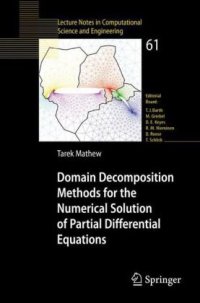
Ebook: Domain Decomposition Methods for the Numerical Solution of Partial Differential Equations
- Genre: Mathematics
- Tags: Computational Science and Engineering, Mathematics of Computing, Computational Intelligence, Computational Mathematics and Numerical Analysis, Partial Differential Equations
- Series: Lecture Notes in Computational Science and Engineering 61
- Year: 2008
- Publisher: Springer-Verlag Berlin Heidelberg
- City: Berlin
- Edition: 1
- Language: English
- pdf
Domain decomposition methods are divide and conquer methods for the parallel and computational solution of partial differential equations of elliptic or parabolic type. They include iterative algorithms for solving the discretized equations, techniques for non-matching grid discretizations and techniques for heterogeneous approximations. This book serves as an introduction to this subject, with emphasis on matrix formulations. The topics studied include Schwarz, substructuring, Lagrange multiplier and least squares-control hybrid formulations, multilevel methods, non-self adjoint problems, parabolic equations, saddle point problems (Stokes, porous media and optimal control), non-matching grid
discretizations, heterogeneous models, fictitious domain methods, variational inequalities, maximum norm theory, eigenvalue problems, optimization problems and the Helmholtz scattering problem. Selected convergence theory is included.
Domain decomposition methods are divide and conquer computational methods for the parallel solution of partial differential equations of elliptic or parabolic type. The methodology includes iterative algorithms, and techniques for non-matching grid discretizations and heterogeneous approximations. This book serves as a matrix oriented introduction to domain decomposition methodology. The topics discussed include hybrid formulations, Schwarz, substructuring and Lagrange multiplier methods for elliptic equations, computational issues, least squares-control methods, multilevel methods, non-self adjoint problems, parabolic equations, saddle point applications (Stokes, porous media and optimal control), non-matching grid discretizations, heterogeneous models, fictitious domain methods, variational inequalities, maximum norm theory, eigenvalue problems, optimization problems and the Helmholtz scattering problem. Selected convergence theory is also included.